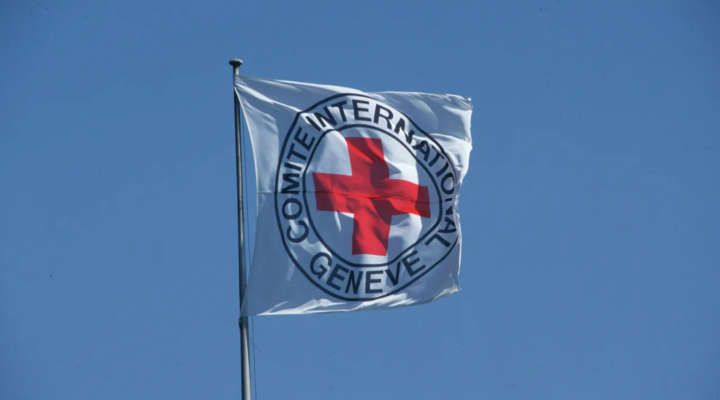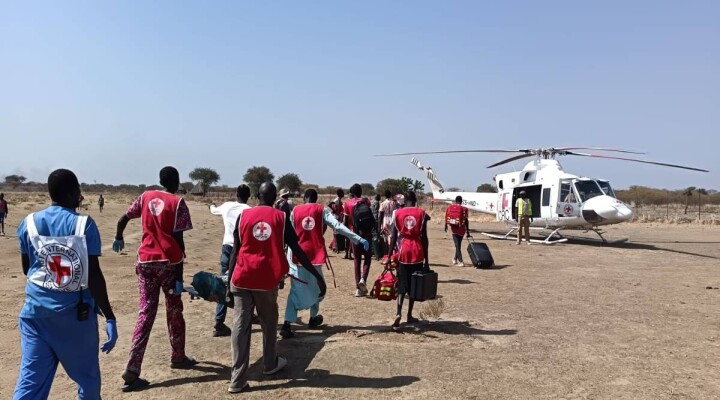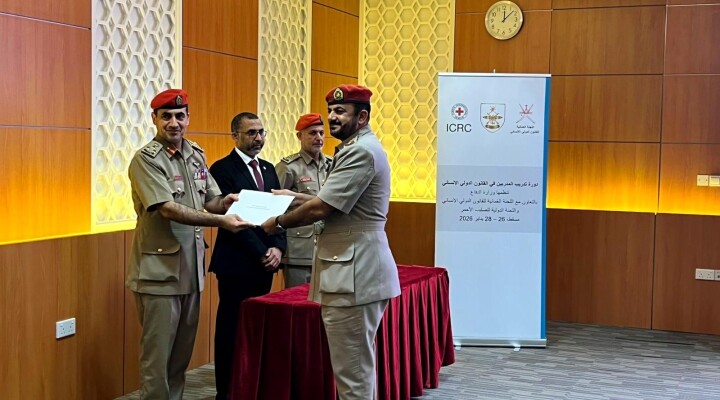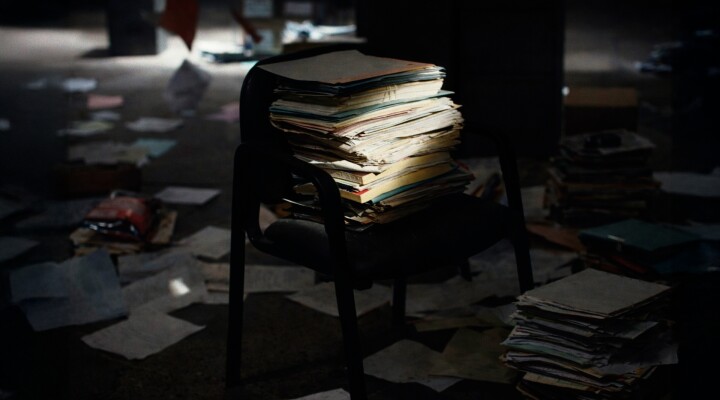Ethiopia: Red Cross sends medicines, relief supplies to Mekelle to fortify paralyzed health care facilities
Addis Ababa / Geneva (ICRC) – A convoy carrying medicines and relief supplies from the International Committee of the Red Cross (ICRC) and the Ethiopian Red Cross Society (ERCS), organized in coordination with the Ethiopian authorities, has reached the Tigray State capital, Mekelle. Health care facilities there have become paralyzed after supplies of drugs and basics like surgical gloves ran out. It is the first international aid to arrive in Mekelle since fighting erupted in Tigray more than one month ago.
“Behind me are trucks loaded with medical assistance and other required aid for our teams on the ground to be distributed to local hospitals and primary health care centres,” said Patrick Youssef, International Committee of the Red Cross’ (ICRC) regional director for Africa from Addis Ababa the day before the trucks left for Mekelle.
Ayder Hospital shuttered its intensive care unit and surgical theatre due to the lack of medical supplies and fuel to run the generator, which the units depend on for electricity. In late November, the hospital received an influx of people wounded in fighting. It has also struggled to provide care for chronic and routine medical needs, including diabetes, dialysis, and maternity and delivery services. It is the main referral hospital for Mekelle’s 500,000 people.
“Mainly on the medical front, hospitals and health care centres are seriously hampered in the delivery of services, just because they don’t have enough material to cope with growing needs,” said Youssef. “The worst for medical personnel, for the health staff, in hospitals and primary health care centres, is to be unable to help, is to be unable to provide support, due to a lack of material due to lack of assistance and lack of stocks, and that’s indeed what we are trying and hoping to achieve by bringing much needed assistance into a region that saw a full lockdown since weeks now.”
The seven Red Cross trucks carry medicines and supplies to care for more than 400 trauma patients as well as items needed to treat chronic and routine medical conditions. These supplies will be donated to Ayder Hospital, the Regional Health Bureau, and the ERCS pharmacy in Mekelle. In addition, ICRC’s team in Mekelle has been working to get the hospital fuel to run its generator as well as water.
The Federal Ministry of Health has delivered additional medical supplies to Ayder Hospital today.
The Red Cross convoy also brought blankets, tarpaulins, kitchen sets, clothes, soap, and jerrycans that can help about 1,000 families forced from their homes by the fighting as well as equipment to improve access to water and sanitation.
At the same time, ICRC teams are in North Amhara and West Tigray, where they are distributing relief items to displaced families and assessing the humanitarian needs caused by the fighting. The ICRC has so far provided medicines and medical supplies to seven health care facilities in Amhara that have received patients injured in fighting. In addition to medical supplies, the ICRC is working with hospitals to support the long-term physical rehabilitation needs of people who suffered amputations because of weapon-related injuries.
“We are almost six weeks into the crisis in Tigray region,” said Youssef. “The crisis has left many displaced, within the Tigray region but also outside. A lot of the social services that should be afforded to the local population is unfortunately hampered, and there we really need to step up the assistance, the support to these vulnerable people, those who didn’t choose to fight and still require our help, our assistance.”
The ICRC counts on the financial support of the international community to deliver humanitarian assistance in Ethiopia. The ICRC has an overall budget of CHF 27 million in Ethiopia, of which CHF 10 million has not been funded.
For further information, please contact:
Zewdu Ayalew, ICRC Addis Ababa, zayalew@icrc.org , +251 911 614 336
Crystal Wells, ICRC Nairobi, cwells@icrc.org , +254 716 897 265 (Whatsapp)
Aurélie Lachant, ICRC Geneva, alachant@icrc.org, +41 79 244 6405
or visit our website: www.icrc.org
SHOTLIST
Location: Addis Ababa
Length: 03:54
Camera: iPhone7
Filming date:
· Supplies being loaded into trucks: 19 November 2020
· Interview with Patrick Youssef: 8 December 2020
· Trucks leaving warehouse: 9 December 2020
Copyright: ICRC access all
On Screen Credit: ICRC or logo
1
00:00:00,000 --> 00:00:11,466
CLOSEUP TRUCK EXITS ICRC COMPOUND APPROACHES, TURNS RIGHT.
2
00:00:11,466 --> 00:00:38,633
(INTERNAL CUT) MORE TRUCKS EXITING ICRC compound
3
00:00:38,633 --> 00:00:54,100
LONGSHOT, FOLLOWS ICRC TRUCKS EXITING round about in ADDIS ABABA
4
00:00:54,100 --> 00:00:58,100
MEDIUM SHOT, MEDICAL SUPPLIES
5
00:00:58,100 --> 00:01:06,266
CLOSEUP, BOXES OF MEDICAL SUPPLIES
6
00:01:06,266 --> 00:01:12,166
INTERVIEW: Patrick Youssef, International Committee of the Red Cross’ (ICRC) regional director for Africa. Behind me are trucks loaded with medical assistance and other required aid
7
00:01:12,166 --> 00:01:19,166
for our teams on the ground to be distributed to local hospitals and primary health care centres.
8
00:01:19,166 --> 00:01:23,833
The contingents are basically those of the Ethiopian Red Cross and the ICRC,
9
00:01:23,833 --> 00:01:34,933
and hoping that we get them as soon as possible to the health workers that really require this assistance as part of their action and contribution towards their communities.
10
00:01:34,933 --> 00:01:59,533
MEDIUM SHOT ,FOLLOWS ICRC TRUCKS EXITING round about in ADDIS ABABA
11
00:01:59,533 --> 00:02:02,766
(CUT) We are almost six weeks into the crisis in the Tigray region,
12
00:02:02,766 --> 00:02:08,566
the crisis that has left many displaced, within the Tigray region but also outside,
13
00:02:08,566 --> 00:02:14,366
a lot of the social services that should be afforded to the local population is unfortunately hampered,
14
00:02:15,133 --> 00:02:27,500
and there we really need to step up the assistance, the support to those vulnerable people, those who didn't choose to fight and will still require our help, our assistance,
15
00:02:27,500 --> 00:02:40,633
mainly on the medical front, hospitals and primary healthcare centres are seriously hampered in the delivery of services, just because they don't have enough material to cope with growing needs.
16
00:02:40,633 --> 00:02:47,033
(CUT) The worst for medical personal, for the health staff, in hospitals and primary healthcare centres,
17
00:02:47,033 --> 00:02:50,633
is to be unable to help,
18
00:02:50,633 --> 00:02:53,000
is to be unable to provide support
19
00:02:53,000 --> 00:02:58,099
due to lack of material due to lack of assistance and to lack of stocks.
20
00:02:58,099 --> 00:03:02,199
and that's indeed what we are trying and hoping to achieve,
21
00:03:02,199 --> 00:03:07,866
by bringing much needed assistance into a region that saw a full lockdown since weeks now,
22
00:03:07,866 --> 00:03:12,666
MEDIUM SHOT, REVERSING FOLK LIFT with BOXES OF MEDICAL SUPPLIES
23
00:03:12,666 --> 00:03:16,533
MEDIUM SHOT, FOLK LIFT LIFTS BOXES OF ASSORTED SUPPLIES INTO A TRUCK
24
00:03:16,533 --> 00:03:26,133
MEDIUM SHOT, ICRC STUFF LOADING BOXES OF ASSORTED SUPPLIES INTO A TRUCK
25
00:03:26,133 --> 00:03:37,266
MEDIUM, LOW ANGLE SHOT, TWO ICRC STUFF ARRANGING BOXES OF ASSORTED SUPPLIES INSIDE A TRUCK
26
00:03:37,266 --> 00:03:40,933
CLOSE UP, LOW ANGLE SHOT, TWO ICRC STUFF ARRANGING BOXES OF ASSORTED SUPPLIES INSIDE A TRUCK
27
00:03:40,933 --> 00:03:45,066
MEDIUM, LOW ANGLE SHOT, TRUCK WITH OPEN DOOR SHOWING BOXES OF ASSORTED SUPPLIES
28
00:03:45,066 --> 00:03:54,900
LONG SHOT, PANS, TRUCKS AT ICRC LOGISTICS CENTRE IN ADDIS ABABA.



